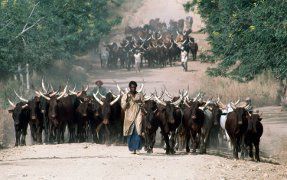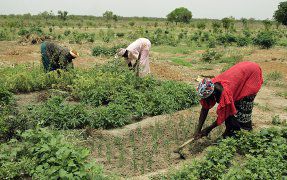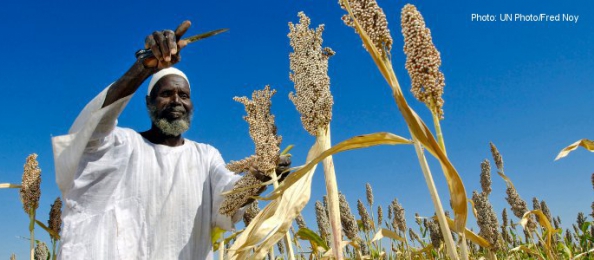Africa’s Natural Assets: The Struggle for Sustainability
During the past decade, African countries have experienced a widespread economic boom, six of the world’s ten fastest-growing countries have been African, and in eight of the past ten years, Africa has grown faster than East Asia. The rate of foreign investment has soared to almost tenfold in this period.
This growth has been driven by a range of factors, including a reduction in regional conflicts, greater political stability and democratization, and new technologies such as mobile communications, which have transformative implications for rural African societies. Perhaps the most important driver, though, has been Africa’s natural wealth, including both non-renewable resources such as oil, gas, and minerals, as well as renewable ones, which include agricultural land, forests, wildlife, water, and fisheries.
The way that natural resources are managed and governed will have enormous implications for the future of African societies. For extractive resources such as fossil fuels and minerals, the challenge is to establish transparent and equitable governance systems to avoid the “resource curse,” whereby these industries fuel corruption and thereby undermine governance and development. An additional challenge is to balance extractive industries with rigorous environmental and social standards and safeguards, in order to avoid the large-scale negative externalities seen in areas such as the Niger Delta.
For renewable resources, the foremost need is for establishing institutional frameworks that promote sustainability in use and exploitation, for example by clearly allocating and enforcing property rights over land, forests, wildlife, and other valuable resources. These issues of natural resource governance lie at the center of the struggle for sustainable development in Africa today; future investments may either contribute to balanced and more equitable growth, or they may alternatively lead to disenfranchisement and resentment, and eventually to the all-too-familiar path of resource-linked violence. As global markets and the demand for African resources continue to expand, the decisions made today about policy reform and development models will have an enormous impact in shaping these future outcomes in fundamental ways.

Africa and the global land and resource rush
The past decade has witnessed a new global rush for land and natural resources due to a range of economic and social factors. Global food prices have more than doubled since 2000, leading to a major shift in demand for agricultural land, as both sovereign nations and major commercial producers seek to acquire large areas of fertile or irrigable land. New industries such as biofuels are further contributing to a surge in land acquisition. Tourism, forestry, and carbon markets generate further demand for rural lands and resources across much of the developing world. In 2009, the World Bank estimated that more than 50 million hectares of agricultural land was being sought that year for acquisition and investment around the world, compared to an average annual acquisition of around 4 million hectares prior to 2008.
Africa has been the focal area for this land and resource rush for several basic reasons. First, African nations such as Sudan, Mozambique, and Ethiopia have large areas of land that are not actively cultivated, and thus appear to be “unused” and available for external allocation and conversion. Secondly, formal legal rights over land, water, and natural resources in Africa tend to be heavily centralized, with the state usually claiming ownership over lands that are not directly farmed or settled, which includes most forests and rangelands. The result of this situation is that the majority of people living in rural areas – perhaps up to 500 million Africans in total – have insecure or inadequate recognition of their customary rights over their land and territories. This particularly impacts forest-dependent communities and pastoralists – groups of people who are heavily reliant on collectively held and managed pastureland and forests, which tend to cover extensive areas. For example, in Africa less than 1 percent of all forests are formally owned or controlled by local communities, compared to about 25 percent of forests in Latin America.
These legally unrecognized community lands – which some estimates place at roughly 1.6 billion hectares in total across sub-Saharan Africa, or around 70 percent of the total land area – also contain much of the region’s natural wealth, in terms of forests, watersheds, rangelands, and wildlife. In Kenya, for example, about 70 percent of all large mammals are found outside of state lands such as national parks, mostly on communally managed rangelands where wildlife lives alongside resident pastoralist communities. These wildlife resources support a tourism industry that accounts for more than $1 billion in annual revenue and roughly 13 percent of GDP in direct and indirect contributions. The reality is similar in Namibia, Tanzania, Botswana, Zambia, and many other countries where wildlife is a major source of tourism investment and one of the most valuable resources in rural areas.
The widespread failure of African governments to legally recognize rural citizens’ customary lands and resources is highly problematic – and dangerous – on a number of fundamental levels. Secure rights over the land that one lives on and depends on for one’s livelihood is an essential human right, and the basis for a stable and growing economy. Insecure property rights undermine livelihoods, investment, and foster conflict and violence. The roots of this failure to recognize local land rights and to maintain overly centralized tenure over forests, wildlife, and other natural resources is an artifact of colonial and post-colonial history. The colonial state claimed ownership over land and resources as a central element of imposing political and economic control over African societies. Post-independence African states maintained this order in the interest of centralized, often socialist nation-building creeds, or in many instances to simply ease governing elites’ access and control over the most valuable resources in a country. State control over land and natural resources has been a core aspect of modern Africa’s political economy, whereby governance has largely revolved around the competition between various elite factions for exploitation and capture of public assets. Often land has been among the most valuable of those assets, with state-linked elites often privately amassing land or, more recently, natural resource concessions.
These political-economic dynamics and constellations of interests have strongly worked against the interests of rural development, natural resource conservation, and democratization in Africa for the past 30 years. Rural citizens have long been deprived rights over the natural resources that their livelihoods depend on. This excludes them from opportunities to partner with external investors and to benefit from the development of new value chains and enterprise opportunities. By depriving rural communities of property rights and control over the economic value of natural resources, incentives for local communities to conserve those resources are eroded. This is a major factor underlying high rates of rural deforestation in many African countries, as well as the uncontrolled illegal hunting that has greatly depleted wildlife in many areas.
Risks and challenges
The current global land rush thus brings into stark relief a number of fundamental contradictions and sources of conflict that characterize natural resource governance in Africa today. Even as Africa’s natural assets increase in value and generate higher levels of interest and investment, both domestically and globally, these market trends may create further incentives for national elites to resist granting local groups more control over these resources, or to recognize local customary property rights. At the same time, though, if greater rights to land and resources are not granted to local people, the stage will be set for increased conflicts over these resources in the future. When governments grant land to investors that in fact – if not in law – is used by and belongs to local communities, conflict is inevitable.
Sometimes these conflicts around land and resources play a major role in the fate of entire nations; the long series of conflicts in Sudan and ultimate independence of South Sudan largely revolved around control over land and natural resources. More recently, the 2009 uprising and coup that led to regime change in Madagascar was at least influenced by the previous government’s decision to grant up to half of the country’s remaining arable land to a South Korean company. Even where such large-scale violence and political instability is avoided, struggles over land rights are increasingly taking center stage in African politics. In Kenya, for example, land was one of the central issues in the constitutional reform process that arose in order to address the violence that took place across the country following the disputed 2007 general election. When the country passed its new constitution in August 2010, land reforms were among the most prominent features, in particular the provisions that reclassify “trust lands” – which had been held by local governments and widely mismanaged – as “community lands” to be held more directly by local-level groups of people. These lands comprise about 70 percent of the total land area of the country.
For private investors in agriculture, forestry, tourism, and other renewable resource industries, these dynamics create substantial risks. Many private investments in these land-based activities in Africa today are taking place in a context of contested property rights and weak governance. This creates risks, both financial and reputational, for companies undertaking projects on the ground, as well as for their financial investors and stakeholders. The underlying source of risk is that many investments are situated on lands that are being allocated by government authorities without the free, prior, and informed consent or authorization of the local communities, who hold customary rights (rights that are in many instances recognized under international, but not national, law) over those lands. Governments are in essence granting lands to investors that they do not in fact hold free and unencumbered property rights to. The result is that, in many cases, investors encounter major conflicts when they acquire such lands. Such conflicts are inevitably costly, and often incur large losses on the part of the investor, particularly if projects must eventually be abandoned due to local legal action or resistance.

Reforms for sustainable growth
African societies face both major risks and growing opportunities as global markets generate more demand for African resources – ranging from wildlife and wilderness for recreational tourism, to minerals and fossil fuels for industrial consumption. In order to minimize negative fallout such as growing social strife, economic inequality, and political instability, and to maximize positive opportunities for growth and investment, two major priorities require more attention and action.
The first is to design and implement far-reaching land tenure reforms that grant clear recognition to citizens’ customary lands, including both individual and group landholdings, as well as the natural resources associated with those lands. It is due to a historic anomaly, a deleterious legacy of colonialism, and the political priorities of post-independence governments that community land rights remain unrecognized – with so much land held by central governments in so many African states today. Property rights are a basic foundation of economic growth, prosperity, and human rights, making land reform a central development priority across Africa. Some countries have recently taken action or are planning reforms – for example, Kenya’s 2010 constitution represents a notable positive example of far-reaching land tenure reform, and land is similarly high on the agenda of Tanzania’s current constitutional reform process. Even the vast and complex Democratic Republic of Congo, where nearly all land and forests are formally owned by the state, has embarked on a land policy development process that has the potential to bring about crucial reforms.
The second priority is to promote greater awareness of the challenges to national development aims and private investments in land-based enterprises that the current land tenure realities create – this includes the current mispricing of tenure risks in financial models of investments – and to promote alternative investment models that mitigate these risks. The most essential element of such alternative models is to shift from the prevalent current pattern, where investors in African countries are often allocated landholdings directly by the state, to where private enterprises and local communities or smallholders directly enter into partnerships or joint ventures. Such models are, in fact, common. There is a long history of contract farming in the agricultural sector across much of Africa. There has also been a great deal of innovation in the tourism sector, with joint ventures between lodges and rural communities, which provide land and access to wildlife and other natural attractions. These models generate greater local equity, control, and benefits. As a result, they mitigate the risk of local conflicts that have been impacting many of the investments pushed through during the recent global land rush. Such win-win arrangements that create new economic opportunities and market access for rural communities through partnerships with external expertise and capital will be critical to the future of African economies. These business models can also play a crucial role in helping to sustain Africa’s natural assets through the right combination of incentives and devolved governance.
Fred Nelson is the Executive Director of Maliasili Initiatives, an organization that promotes sustainable natural resource management and conservation in Africa by focusing on building the capacity of leading local civil society organizations and facilitating collaborative approaches.
About Us // Privacy Policy // Copyright Information // Legal Disclaimer // Contact
Copyright © 2012-2018 macondo publishing GmbH. All rights reserved.
The CSR Academy is an independent learning platform of the macondo publishing group.









